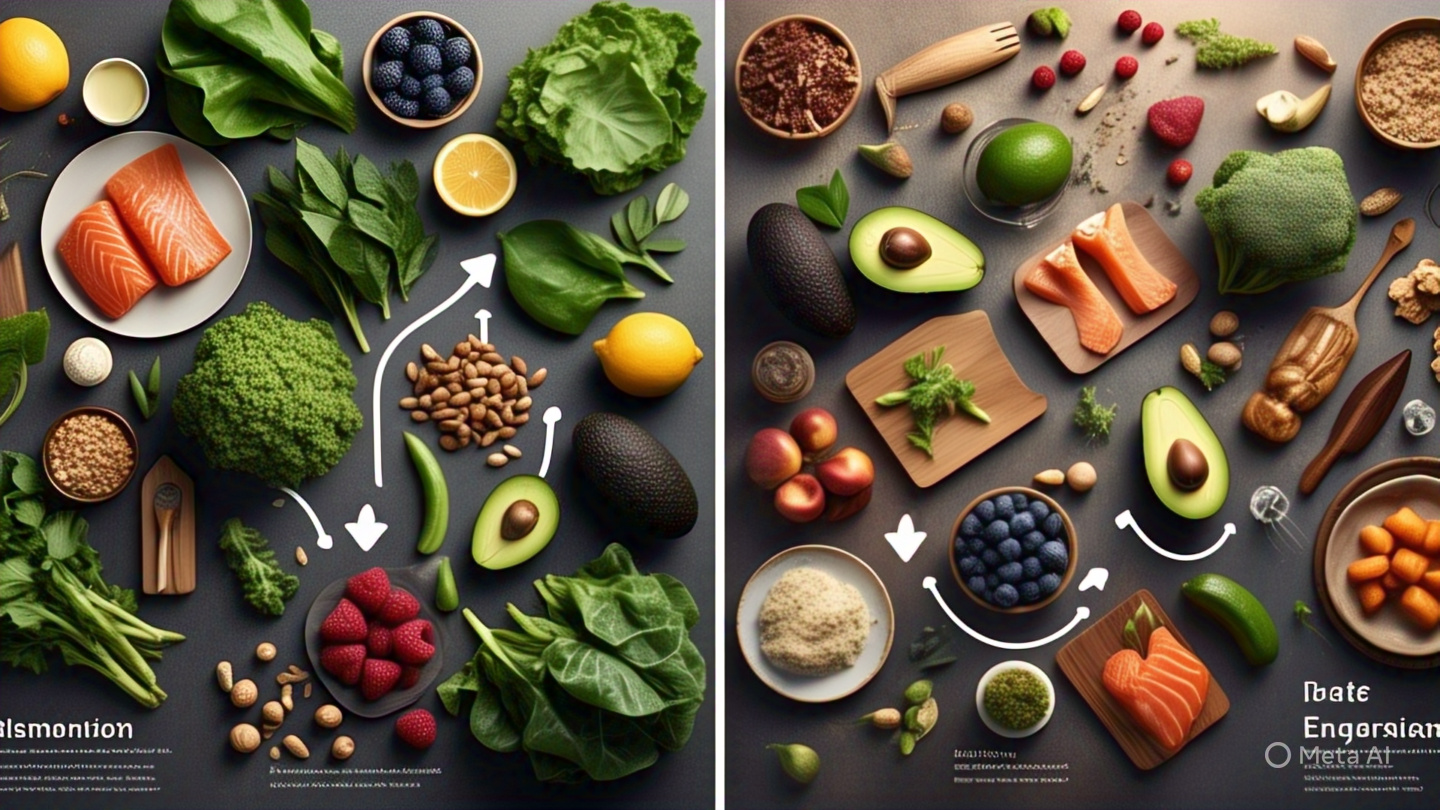Understanding Hormonal Balance: The Role of Testosterone and Estrogen
The Basics of Hormones
Hormones are chemical messengers produced by glands in the endocrine system, playing a crucial role in regulating various bodily functions. They influence everything from metabolism and mood to growth and reproductive health. Maintaining hormonal balance is essential for overall well-being, as imbalances can lead to a range of health issues, including fatigue, weight gain, and mood disorders.
Among these hormones, testosterone and estrogen are particularly significant. Testosterone, primarily associated with male health, is also vital for women, while estrogen is often linked to female health but is important for men as well. Understanding the roles of these hormones helps us appreciate how they contribute to our physical and emotional health.
Why Testosterone and Estrogen Matter
Testosterone is crucial for muscle mass, bone density, and libido in both men and women. It also impacts mood and energy levels. On the other hand, estrogen plays a key role in regulating the menstrual cycle and maintaining bone health.
Both hormones contribute to emotional well-being, and a deficiency or excess can lead to significant health challenges. Recognizing how testosterone and estrogen function within the body highlights their importance in achieving hormonal harmony.
The Connection Between Hormones and Wellness
The interplay between testosterone, estrogen, and overall wellness cannot be overstated. These hormones not only influence physical attributes but also affect mental clarity and emotional stability.
An imbalance can lead to stress, anxiety, and even chronic diseases. Thankfully, lifestyle choices such as diet play a pivotal role in regulating hormone levels. By understanding how our food choices impact testosterone and estrogen, we can take proactive steps towards achieving hormonal balance and enhancing our overall health.
How Diet Impacts Hormonal Levels
Diet plays a crucial role in regulating hormonal levels, particularly testosterone and estrogen. The food we consume directly influences hormone production, making our dietary choices immensely significant. Nutrients from macronutrients, such as proteins, fats, and carbohydrates, to micronutrients like vitamins and minerals, all contribute to maintaining hormonal balance.
The Macronutrients that Matter
Macronutrients are essential for hormone synthesis. Proteins provide the amino acids necessary for hormone production, while healthy fats are vital for creating steroid hormones, including testosterone. Carbohydrates also play a role, as they provide energy and can influence insulin levels, which in turn affect other hormones. Balancing these macronutrients is key in supporting optimal hormonal function.
Micronutrients and Hormonal Function
Micronutrients, though needed in smaller amounts, are just as critical for hormonal health. Vitamins like D and B6, as well as minerals such as zinc and magnesium, are essential for testosterone production and overall hormonal balance. Deficiencies in these micronutrients can lead to significant hormonal disruptions, highlighting the importance of a well-rounded diet rich in fruits, vegetables, and whole foods.
Food Choices and Hormonal Production
Specific food choices have been shown to directly impact hormonal levels. For instance, diets rich in omega-3 fatty acids from fish or flaxseeds can help optimize testosterone levels. Conversely, high sugar and processed food consumption has been linked to hormonal imbalances. Studies indicate that a diet high in whole foods can improve hormone production, making dietary awareness a vital aspect of long-term wellness.
Foods That Boost Testosterone
When considering foods that can help increase testosterone levels, it’s essential to focus on those that support hormone production naturally. A balanced diet rich in specific nutrients can play a significant role in maintaining hormonal balance.
The Power of Healthy Fats
Healthy fats are crucial for testosterone production. Foods like avocados, olive oil, and nuts provide monounsaturated and polyunsaturated fats, which have been linked to improved hormone levels. A study published in the Journal of Clinical Endocrinology found that men who consumed diets high in healthy fats had higher testosterone levels compared to those with low-fat diets. Incorporating sources of omega-3 fatty acids, such as fatty fish, can also contribute positively, offering anti-inflammatory benefits that support overall hormonal health.
Importance of Protein Sources
Protein is fundamental for maintaining muscle mass and optimizing testosterone levels. Lean meats, poultry, fish, and plant-based sources like legumes and quinoa provide the building blocks necessary for hormone synthesis. Research indicates that diets high in protein can lead to increased testosterone levels, particularly when combined with resistance training. Additionally, protein helps regulate body fat, which is important since higher body fat percentages can negatively impact hormone levels.
Vitamins and Minerals for Testosterone
Certain vitamins and minerals are vital for testosterone production. Zinc and vitamin D are particularly noteworthy; they have been shown to enhance testosterone levels effectively. Foods rich in zinc, such as oysters, red meat, and beans, can boost testosterone levels. Similarly, fatty fish and fortified foods are great sources of vitamin D. Studies indicate that men with adequate levels of these nutrients tend to have higher testosterone levels, highlighting the importance of including these foods in your diet for optimal hormonal health.
Foods That Increase Estrogen
Estrogen plays a crucial role in maintaining various bodily functions, and incorporating certain foods into your diet can help boost its levels naturally. These estrogen-boosting foods often contain phytoestrogens, plant-derived compounds that mimic the effects of estrogen in the body. This can be particularly beneficial for individuals experiencing hormonal imbalances or those looking to support their overall health.
Understanding Phytoestrogens
Phytoestrogens are compounds found in various plant foods that can interact with estrogen receptors in the body. They can help balance hormone levels, making them valuable additions to a diet aimed at increasing estrogen. Common sources include soy products, flaxseeds, and legumes. Studies suggest that diets rich in phytoestrogens may contribute to improved hormonal health and reduced symptoms associated with low estrogen levels.
Vegetables and Fruits that Help
Certain vegetables and fruits can also play a significant role in boosting estrogen levels. For instance, cruciferous vegetables like broccoli and cabbage contain compounds that support estrogen metabolism. Additionally, fruits such as berries and pomegranates are rich in antioxidants and can help maintain hormonal balance. Including a colorful variety of produce in your meals ensures you reap the benefits of these estrogen-friendly options.
The Role of Whole Grains
Whole grains like oats, barley, and brown rice are not only excellent sources of fiber but also contain phytoestrogens. These grains help regulate blood sugar levels, which can positively impact hormone production. Including whole grains in your diet can provide sustained energy and promote overall hormonal health. Studies have shown that individuals consuming whole grains regularly may experience better hormonal balance, further emphasizing their importance in a diet aimed at increasing estrogen.
Foods to Avoid for Hormonal Balance

To maintain hormonal balance, it’s crucial to identify foods that can negatively impact testosterone and estrogen levels. Diet plays a pivotal role in regulating these hormones, and certain food choices can lead to imbalances that affect overall health and wellness.
The Dangers of Processed Foods
Processed foods are often loaded with artificial additives, preservatives, and unhealthy fats that can disrupt hormonal function. These foods may contain high levels of refined carbohydrates and sugars, leading to insulin resistance and ultimately impacting testosterone and estrogen levels. Studies suggest that a diet high in processed foods can contribute to obesity, which is closely linked to hormonal imbalance.
Sugar’s Hidden Impact on Hormones
Excessive sugar intake can wreak havoc on hormonal health. High sugar consumption leads to spikes in insulin, which can suppress testosterone production and promote estrogen dominance. Research indicates that diets high in sugar are associated with a higher risk of developing hormonal disorders, such as polycystic ovary syndrome (PCOS) in women. Reducing sugar intake is essential for stabilizing hormones and promoting overall health.
Unhealthy Fats: Friend or Foe?
Not all fats are created equal. Trans fats and excessive saturated fats, commonly found in fried foods and certain baked goods, can interfere with hormone production. These unhealthy fats may lower testosterone levels and promote inflammation, exacerbating hormonal imbalances. In contrast, healthy fats from sources like avocados, nuts, and olive oil can support hormone health. Choosing the right type of fat is vital for maintaining hormonal balance.
The Importance of a Balanced Diet
A balanced diet plays a crucial role in maintaining hormonal balance, particularly for testosterone and estrogen levels. When our bodies receive a variety of nutrients, we support the intricate systems that regulate hormones. On the flip side, imbalanced diets can lead to hormonal disorders, which are increasingly linked to factors such as processed foods and high sugar intake. In fact, studies show that nearly 50% of adults experience some form of hormonal imbalance, often exacerbated by poor dietary choices.
What Does a Balanced Diet Look Like?
A balanced diet should include a mix of macronutrients—carbohydrates, proteins, and healthy fats—as well as essential vitamins and minerals. Incorporating whole grains, lean proteins, fruits, vegetables, and healthy fats can help maintain optimal hormonal levels. Avoiding extreme diets and embracing variety ensures that the body gets a comprehensive range of nutrients necessary for hormone production and regulation.
Meal Planning for Hormonal Health
Effective meal planning is essential for hormonal health. By preparing meals ahead of time, you can ensure that your diet includes a rich variety of nutrients. Focus on incorporating foods that promote hormonal balance, such as leafy greens, fatty fish, nuts, and seeds. Planning meals around these foods helps you avoid unhealthy options when hunger strikes, keeping your hormone levels stable and your body nourished.
Long-Term Benefits of Dietary Changes
Making gradual dietary changes can have significant long-term benefits for hormonal balance. Over time, a well-rounded diet not only improves hormone levels but also enhances overall well-being, energy levels, and mood. By committing to a balanced diet, you’re investing in your future health, potentially reducing the risk of hormonal disorders and associated health issues. Small, consistent changes can lead to a healthier lifestyle and improved quality of life.
Tips for Sustainable Dietary Changes
Making lasting dietary adjustments can feel overwhelming, but with the right approach, it can be a manageable and rewarding journey.
Start Small: Easy Swaps
Begin by making small, easy swaps in your diet. For example, replace sugary beverages with water or herbal tea, and choose whole grains over refined grains.
These minor changes can significantly impact your hormonal health over time. Research shows that individuals who start with small adjustments are more likely to stick with their new habits.
Staying Motivated on Your Journey
Staying motivated is key to maintaining dietary changes. Set realistic goals and celebrate your achievements, no matter how small.
Consider joining a community or finding a buddy who shares similar health goals. Sharing experiences can provide encouragement and accountability, making the journey more enjoyable.
Tracking Your Progress
Keeping track of your dietary changes can help you stay focused and recognize patterns.
Use a journal or mobile app to log your food intake and monitor how different foods affect your energy and mood. Studies indicate that tracking progress increases the likelihood of long-term success in dietary changes.
By becoming aware of your habits, you can make informed adjustments that support your hormonal balance.
